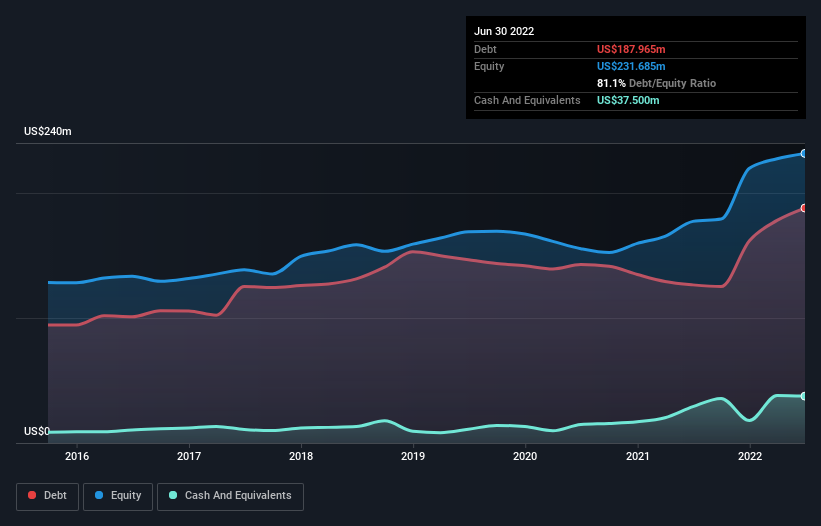- United States
- /
- Hospitality
- /
- NasdaqGM:RICK
Is RCI Hospitality Holdings (NASDAQ:RICK) A Risky Investment?

The external fund manager backed by Berkshire Hathaway's Charlie Munger, Li Lu, makes no bones about it when he says 'The biggest investment risk is not the volatility of prices, but whether you will suffer a permanent loss of capital.' It's only natural to consider a company's balance sheet when you examine how risky it is, since debt is often involved when a business collapses. Importantly, RCI Hospitality Holdings, Inc. (NASDAQ:RICK) does carry debt. But should shareholders be worried about its use of debt?
When Is Debt Dangerous?
Generally speaking, debt only becomes a real problem when a company can't easily pay it off, either by raising capital or with its own cash flow. In the worst case scenario, a company can go bankrupt if it cannot pay its creditors. However, a more usual (but still expensive) situation is where a company must dilute shareholders at a cheap share price simply to get debt under control. By replacing dilution, though, debt can be an extremely good tool for businesses that need capital to invest in growth at high rates of return. The first step when considering a company's debt levels is to consider its cash and debt together.
View our latest analysis for RCI Hospitality Holdings
What Is RCI Hospitality Holdings's Net Debt?
The image below, which you can click on for greater detail, shows that at June 2022 RCI Hospitality Holdings had debt of US$188.0m, up from US$126.5m in one year. However, it also had US$37.5m in cash, and so its net debt is US$150.5m.

How Strong Is RCI Hospitality Holdings' Balance Sheet?
Zooming in on the latest balance sheet data, we can see that RCI Hospitality Holdings had liabilities of US$33.7m due within 12 months and liabilities of US$236.8m due beyond that. On the other hand, it had cash of US$37.5m and US$4.18m worth of receivables due within a year. So it has liabilities totalling US$228.8m more than its cash and near-term receivables, combined.
RCI Hospitality Holdings has a market capitalization of US$654.9m, so it could very likely raise cash to ameliorate its balance sheet, if the need arose. But it's clear that we should definitely closely examine whether it can manage its debt without dilution.
We use two main ratios to inform us about debt levels relative to earnings. The first is net debt divided by earnings before interest, tax, depreciation, and amortization (EBITDA), while the second is how many times its earnings before interest and tax (EBIT) covers its interest expense (or its interest cover, for short). This way, we consider both the absolute quantum of the debt, as well as the interest rates paid on it.
RCI Hospitality Holdings's net debt is sitting at a very reasonable 1.9 times its EBITDA, while its EBIT covered its interest expense just 6.4 times last year. While that doesn't worry us too much, it does suggest the interest payments are somewhat of a burden. Importantly, RCI Hospitality Holdings grew its EBIT by 84% over the last twelve months, and that growth will make it easier to handle its debt. The balance sheet is clearly the area to focus on when you are analysing debt. But ultimately the future profitability of the business will decide if RCI Hospitality Holdings can strengthen its balance sheet over time. So if you're focused on the future you can check out this free report showing analyst profit forecasts.
But our final consideration is also important, because a company cannot pay debt with paper profits; it needs cold hard cash. So we clearly need to look at whether that EBIT is leading to corresponding free cash flow. Over the most recent three years, RCI Hospitality Holdings recorded free cash flow worth 57% of its EBIT, which is around normal, given free cash flow excludes interest and tax. This free cash flow puts the company in a good position to pay down debt, when appropriate.
Our View
Happily, RCI Hospitality Holdings's impressive EBIT growth rate implies it has the upper hand on its debt. And we also thought its conversion of EBIT to free cash flow was a positive. All these things considered, it appears that RCI Hospitality Holdings can comfortably handle its current debt levels. On the plus side, this leverage can boost shareholder returns, but the potential downside is more risk of loss, so it's worth monitoring the balance sheet. The balance sheet is clearly the area to focus on when you are analysing debt. But ultimately, every company can contain risks that exist outside of the balance sheet. For example - RCI Hospitality Holdings has 3 warning signs we think you should be aware of.
Of course, if you're the type of investor who prefers buying stocks without the burden of debt, then don't hesitate to discover our exclusive list of net cash growth stocks, today.
New: AI Stock Screener & Alerts
Our new AI Stock Screener scans the market every day to uncover opportunities.
• Dividend Powerhouses (3%+ Yield)
• Undervalued Small Caps with Insider Buying
• High growth Tech and AI Companies
Or build your own from over 50 metrics.
Have feedback on this article? Concerned about the content? Get in touch with us directly. Alternatively, email editorial-team (at) simplywallst.com.
This article by Simply Wall St is general in nature. We provide commentary based on historical data and analyst forecasts only using an unbiased methodology and our articles are not intended to be financial advice. It does not constitute a recommendation to buy or sell any stock, and does not take account of your objectives, or your financial situation. We aim to bring you long-term focused analysis driven by fundamental data. Note that our analysis may not factor in the latest price-sensitive company announcements or qualitative material. Simply Wall St has no position in any stocks mentioned.
About NasdaqGM:RICK
RCI Hospitality Holdings
Through its subsidiaries, engages in the hospitality and related businesses in the United States.
Moderate growth potential with mediocre balance sheet.


